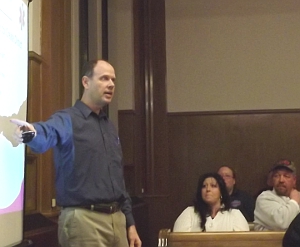|
Decision pending on ambulance tax
district |
|
February 29, 2012 |
Not many people spoke at Tuesday night's public
hearing regarding the formation of a Boundary
County Ambulance District, but those who did
gave county commissioners a lot to think about,
and county commissioners made no attempt to even
try, tabling consideration until March 20, and
reopening the period during which they'll accept
written comment through March 12.
 |
|
Attorney
Brian Woods |
The meeting started out in the Extension Office,
but early on it became obvious that the small
room wouldn't contain all the people who
attended, and the meeting was shifted to the big
courtroom. Even there, the 12 pews filled
quickly, several took up Commission Chair Ron
Smith's invitation to sit in the 12 seats of the
jury box, and still, several people were left
standing for more than three hours.
While it wasn't a matter technically under
discussion, commissioners allowed an opening
statement from representatives of Boundary
Volunteer Ambulance, the organization that
promulgated the petition requesting formation of
the county-wide district and the hearing, who
used the opportunity to not only argue that such
a district was needed, but to pitch themselves
as the potential beneficiary, citing nearly 50
years of volunteer service to the county, and
the fact that without relief, the
community-based service might disappear.
While their argument may have been premature, it
didn't fall on deaf ears, though it did raise a
number of questions among those in attendance.
Commissioners were forced to sift through a lot
of chaff, and it was hard, at times, to
determine who favored a tax district, who
opposed, and who just stood up to thank the
volunteers of Boundary Volunteer Ambulance,
which everyone who spoke did, often effusively.
No one who spoke questioned the dedication of
our local EMTs or the services they provide our
community. but several, including some EMTs
themselves, questioned whether or not the
formation of a taxing district was either
necessary or wise.
Technically, the role of Boundary Volunteer
Ambulance should not have been an issue; county
commissioners, by Idaho law, are required to
provide ambulance service. The question they
have to consider is not who provides the
service, but how. Until now, the county has
fulfilled the requirements of law by providing
an $8,000 annual stipend and a place to house
some of the BVA equipment.
If an ambulance taxing district were to be
approved, commissioners owe no debt to BVA; they
would be free to select and fund both the level
of emergency services they deem needed as well
as who provides the service, be it Boundary
Volunteer Ambulance or any other entity capable
of providing the service.
While it may have been premature, BVA Chief Ken
Baker and the association's attorney, Brian
Woods, very aptly demonstrated the association's
dedication and service, citing increased call
volume, decreasing numbers of volunteers willing
to jump out of bed or leave paying jobs to
answer the pager when someone has need. The
goal,Woods said, was not to place a burden on
the property owner, but to meet the requirements
to provide the services this community needs,
particular its ability to transport critical
patients to regional facilities.
When that need arises, he said, minutes are
critical, and people have died waiting.
By law, BVA, qualified as an intermediate life
support (ILS) provider, can't take those calls;
an ALS unit, Advanced Life Support, is required,
and patients here are often stuck waiting for a
LifeFlite Helicopter or an ALS-level ambulance
service, to drive here from Sandpont, Coeur
d'Alene or Spokane ... whichever is available.
The helicopter is best, but it can't fly when
the weather is inclement.
While no one in attendance seemed to want anyone
but BVA ... a non-profit organization ... to
continue to serve the needs of this community,
the ideas on how to fund and who should pay ran
a gamut. There were questions raised as to
whether upgrading BVA to meet ALS requirements
was needed.
The most poignant testimony came from Joe
Farrell, whose daughter, Amy, died in 2009. The
EMTs did an outstanding job, he said, and the
local hospital did as well. Because of the
extent of her injuries, he and his family waited
agonizing moments that were precious, waiting
for the ambulance from Sandpoint to drive up,
and then drive her back down to a facility that
might have saved her, had she arrived in time.
A taxing district to support the ability of a
local ambulance service to make such transports,
he said, could spare others the grief he and his
family suffered.
Steve Tanner's testimony, while not drawing
tears, was also lauded.
He asked if there weren't other means available
to retain the service without placing a burden,
and a threat, on property owners.
"There are ways to raise funds without
coercion," he said. Instead of retaining
non-profit status, the association could go to
for-profit status.
"Instead of putting a gun to the head of the
property owner, who risks losing their land if
he doesn't pay, maybe the ambulance
service should look at doing what every other
business does ... turn a profit for the services
they provide and which we need and appreciate.
Don't put it on the taxpayer ... don't hold a
gun to his head and say 'pay, or else.'"
Those who'd like to submit written material can
send it to Commissioners, PO Box 419, Bonners
Ferry, ID 83805, or email
commissioners@boundarycountyid.org. The
hearing will be reopened at 6 p.m. Tuesday,
March 20, in the main courtroom.
|
|
|
|
|

